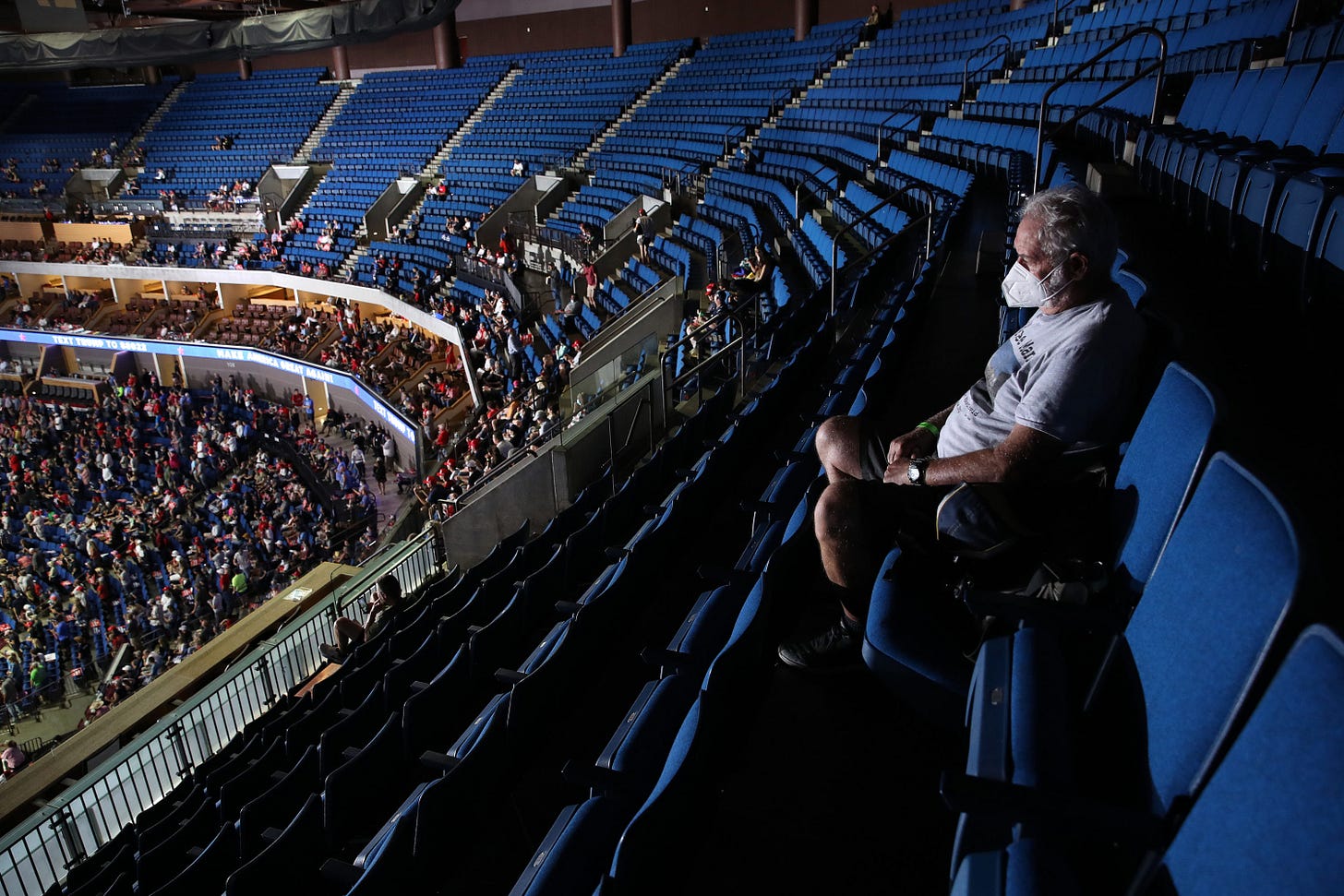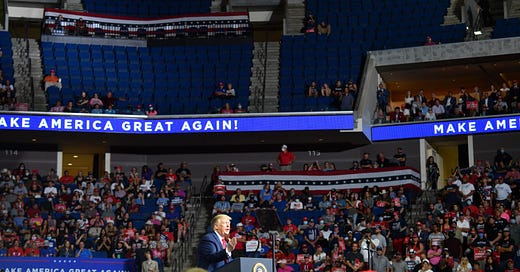
On Saturday afternoon there was a palpable sense of dread in the news, as President Trump was building up to a rally poised to be a campaign event that was unique in its depravity. The president had called tens—hundreds (!!)—of thousands of people to Tulsa to gather inside a sweaty stadium, without masks, in a mass-contagion event that was sure to feature a hate-fueled rant targeting the Black Lives Matter protests that have enveloped the nation.
The impending rally felt like a plotline from an HBO show about a dystopian alternate timeline in which a buffoonish celebrity strongman forces his followers to pack themselves into a dangerous arena amidst a global pandemic.
But as Trump took the stage, the story transformed from dystopian fiction to absurdist farce.
It turned out that President Trump was not, in fact, set to appear in front of throngs of MAGA die-hards who were waiting for their dear leader while stirring a COVID-Kool-Aid. Instead he was about to appear before a half-empty arena and complain about people who are mean to him.
The Trump on display in Tulsa was not a strong man steeling himself for a crackdown against protesters while standing astride a silent majority of mask-eschewing followers with a death wish.
Instead, out from behind the curtain came a weak and whiny D-list Rodney Dangerfield, obsessed with minor slights and not getting enough respect from the Fake News Media that he claims to hate but seems to be kind of super into.
This is not to say that the speech was free of evil: He claimed to have asked that COVID-19 testing to be slowed down in the hopes his mismanagement wouldn’t look as bad; he described the virus that has killed 120,000 Americans in 4 months (and counting) as “the sniffles”; and he repeatedly attacked Black Lives Matters protesters as violent thugs.
Yet these bromides felt gross but rote. Like a guy hitting his spots even after losing confidence in his routine, because he doesn’t know any other material.
What Tulsa revealed was a disrobed Emperor Orangius. The man who once obsessed over his great poll numbers is down everywhere, by nearly double digits. The man who bragged every day about the economy is staring at 13 percent unemployment. The man who gloried in the throngs of packed auditoriums and expected a crowd so big that he would have to give a second performance at an outdoor venue stood in the middle of an arena surrounded by empty blue seats, having been thwarted by TikTok teens.
A transition to greatness this was not.
Tulsa was supposed to be the place where Trump reset his troubled reelection campaign. Since his last rally was canceled—an aborted March show in Tampa—the economy has tanked, 120,000 Americans have died, and there has been a national awakening over police misconduct. Forced to acknowledge reality, the Trump campaign changed its slogan from “Keep America Great” to “Make America Great Again, Again.” Then to “Transition to Greatness.” (I hold out hope that once Brad Parscale realizes he’s toast, he’ll float “Continuity with Change” on his way out the door.)
On Saturday it was unclear just what this transition is supposed to be. Over the course of an eleventy-thousand minute address, Trump produced neither a vision for the next four years, nor a unifying theme of his campaign.
But while his vision for the country may have been opaque, the issues that animate his imagination were abundantly clear. He cares a lot—a lot—about the meanies in the Fake News media.
In the very first stanza of his speech, Trump blamed the meager crowd on the Fake News for inciting fear about public health and the supposed dangers of packing thousands of people into a closed space in the middle of a pandemic.
He went on to attack the press for not accurately describing the nature of the protests, which he believes are much more violent than the media will admit.
He claimed the media are not actually the “elites” and that he is because he has better hair, nicer properties, nicer houses, nicer apartments, and nicer everything than the reporters who cover him.
Among a series of other complaints, Trump went on a 16-minute (yes, 16-minute) diatribe about the way the media covered his speech at West Point. This soliloquy included a harangue about how tiring it was for him to salute 600 cadets. At this point he mimed the hand gesture several times to demonstrate how much it would tire one’s arm.
He went on to relay the extended back and forth he had with a nameless general plotting the best route for him to descend the stage. After describing the limitations he faced from the soles of his shoes, he repeatedly expressed a significant rampophobia. Here he pantomimed the hunched posture that he felt had been required to safely descend the modest slope. At the conclusion of this—what is one to even call it?—he dedicated several more minutes to explaining that he used two hands to hold a very small cup of water only because of how tired all the saluting had made him.
Put aside the question about whether any of this sounds like a man in control of his faculties. And put aside how anyone could see this sad, elderly fellow as a model of strength.
Just as a political matter: What exactly is the angle here?
To me, the obvious answer is: There isn’t one.
Donald Trump doesn’t know how to manage a global pandemic. He doesn’t understand how said crisis intersects with our economic decline or what to do about it. He is fundamentally incapable of being a uniter or a salve for a country that is raw with pain over police violence and racial tensions. And he doesn’t know what to do about the fact that Joe Biden is schlonging him in the polls.
So Trump didn’t go to Tulsa with a strategic communications goal that would help him address any of these problems. And he didn’t go there to demonstrate that he was a deal-maker, a businessman, who is ready to lead a fractured country into a glorious transition back to—or maybe onward to?—greatness.
No. He went to Tulsa because he had gone almost four months without the mass adulation to which he had grown accustomed. And it made him grumpy.
Donald Trump went to Tulsa to fill a hole in his heart. To hear people cheer for him. To complain about those who have insulted him.
He went to a state he knows he’ll carry even if Joe Biden wins 400 electoral votes because he knew this was a place where he would be loved by a sea of “his people.”
And he didn’t even get that.

Go sad trombone! (Win McNamee/Getty Images)











